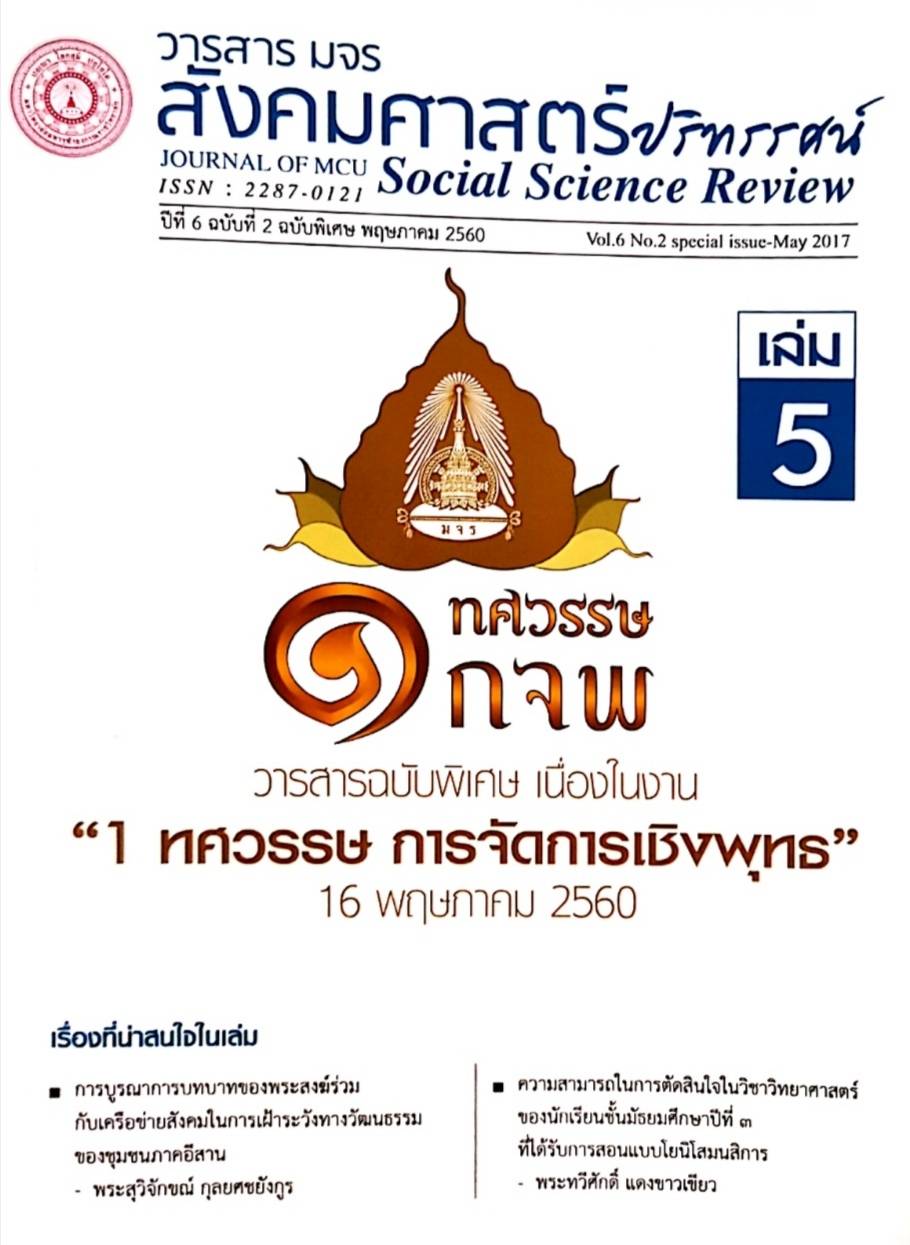รูปแบบการพัฒนาจริยธรรมการพยาบาลเชิงพุทธจิตวิทยา
บทคัดย่อ
การศึกษาวิจัยครั้งนี้ มีวัตถุประสงค์เพื่อ1)ศึกษาแนวคิดจริยธรรมการพยาบาลตามแนวพระพุทธศาสนาและจริยธรรมวิชาชีพพยาบาล 2) เพื่อสร้างรูปแบบการพัฒนาจริยธรรมการพยาบาลเชิงพุทธจิตวิทยา และ3) เพื่อทดลองใช้รูปแบบการพัฒนาจริยธรรมการพยาบาลเชิงพุทธจิตวิทยา เป็นการวิจัยกึ่งทดลอง (Quasi - Experimental Research) โดยดำเนินการวิจัยตามแบบแผนวิจัย Two Group Pretest-Post test Design ใช้กระบวนการกลุ่ม กลุ่มตัวอย่างเป็นนักศึกษาพยาบาลวิทยาลัยพยาบาลบรมราชชนนี สระบุรี จำนวน 56 คน กลุ่มควบคุม 28 คน กลุ่มทดลอง 28 คน เครื่องมือที่ใช้ในการศึกษาวิจัย ประกอบด้วย แบบประเมินคุณธรรมจริยธรรมในนักศึกษาพยาบาล และรูปแบบการพัฒนาจริยธรรมการพยาบาลเชิงพุทธจิตวิทยา ประกอบด้วยชุดกิจกรรม โดยมีการวิเคราะห์ข้อมูลด้วยการแจกแจงความถี่ ค่าร้อยละ ค่าเฉลี่ย ( ) ค่าส่วนเบี่ยงเบนมาตรฐาน (SD) สถิติ Paired-t-test
ผลการศึกษาหลักแนวคิดจริยธรรมการพยาบาลตามแนวพระพุทธศาสนาและจริยธรรมวิชาชีพพยาบาล พบว่าการพยาบาลเป็นวิชาชีพที่พัฒนามาจากความสำนึกทางจริยธรรมที่มนุษย์มีต่อกัน วิชาชีพพยาบาลมุ่งให้ความสำคัญในการช่วยเหลือบุคคลทั้งทางด้าน ร่างกาย จิตใจ อารมณ์ และสังคม มีหลักจริยธรรมประจำตนคือ มีความเมตตากรุณา อดทน เสียสละ รับผิดชอบ และมีวิจารณญาณที่สามารถมองปัญหาแบบองค์รวม และสามารถตัดสินใจบนพื้นฐานของหลักจริยธรรมได้
ผลการศึกษาการสร้างรูปแบบการพัฒนาจริยธรรมการพยาบาลเชิงพุทธจิตวิทยาพบว่า การพัฒนารูปแบบการอบรมจริยธรรมตามแนวพุทธจิตวิทยา คือ จริยธรรมที่อยู่ภายใน ได้แก่ ความรู้เชิงจริยธรรม ความคิด ความรู้สึก ความดี ทัศนคติ และความเชื่อ รวมทั้งการใช้เหตุผลเชิงจริยธรรม ได้แก่ พฤติกรรมเชิงจริยธรรม ลักษณะของจริยธรรมเป็นสิ่งที่เรียนรู้ได้ และเกิดขึ้นควบคู่กับการพัฒนาการทางเชาว์ปัญญา แปรเปลี่ยนไปตามสถานการณ์ ลักษณะของจริยธรรมภายนอกจะมีเหตุผล โดยตรงต่อความสงบสุขแก่ตนเองและสังคม
ผลการทดลองใช้รูปแบบการพัฒนาจริยธรรมการพยาบาลเชิงพุทธจิตวิทยา พบว่า กลุ่มตัวอย่างที่เข้าร่วมกิจกรรมพัฒนาคุณธรรมจริยธรรมเชิงพุทธจิตวิทยา มีค่าคะแนนการพัฒนาคุณธรรมจริยธรรมภายหลังการเข้าร่วมกิจกรรมสูงกว่าก่อนการเข้าร่วมกิจกรรมทุกด้าน โดยเฉพาะในด้านซื่อสัตย์การปฏิบัติตามจรรยาบรรณวิชาชีพและมีความสามารถจัดการกับปัญหาจริยธรรมในการดำรงชีพและในการปฏิบัติงานในวิชาชีพการพยาบาล และด้านการส่งเสริมให้ผู้ป่วย/ผู้ใช้บริการได้รับรู้และเข้าใจสิทธิของตนเองเพื่อปกป้องสิทธิของตนเองที่จะถูกละเมิด การวิจัยนี้สรุปโดยภาพรวมพบว่า รูปแบบการพัฒนาจริยธรรมการพยาบาลเชิงพุทธจิตวิทยาที่ผู้วิจัยพัฒนาขึ้นสามารถพัฒนาจริยธรรมการพยาบาลได้อย่างมีนัยสำคัญทางสถิติที่ .05
เอกสารอ้างอิง
ชัยวัฒน์ สุทธิรัตน์. (2552). 80 นวัตกรรมการจัดการเรียนรู้ที่เน้นผู้เรียนเป็นสำคัญ. กรุงเทพฯ : แดเน๊กซ์ อินเตอร์คอร์ปอเรชั่น.
พระพรหมคุณาภรณ์ (ป.อ.ปยุตฺโต). (2556). ปรัชญาการศึกษาของไทย ภาค พุทธธรรม : แกนนำการศึกษา. กรุงเทพฯ :สำนักพิมพ์ผลิธัมม์ ในเครือ บริษัท สำนักพิมพ์เพ็ท แอนด์โฮม จำกัด.
มณีอาภานันทิกุล และคณะ. (2556). จริยธรรมในวิชาชีพพยาบาล. กรุงเทพฯ: สํานักงานกองทุน สนับสนุนการวิจัย (สกว),
Hayne . (1990). Moore and Osborne. Nursing Ethics: A Turning Point.
Kim, S. Cameron and Robert E. Quinn. (1999). Diagnosing and Changing Organization Culture. Michigan: Addison-Wesley.
Schattschneider. (1992). Ethics for the Nineties. The Canadian Nurse.
Stringer, R. (2002). Leadership and Organizational Climate. New Jersey: MC Graw-Hill.
Campbell, Donald T. and Jultan C. Stanley. (1965). Experimental and Quasi-experimental Designs for Research. Chicago: Rand McNally College.
ดาวน์โหลด
เผยแพร่แล้ว
รูปแบบการอ้างอิง
ฉบับ
ประเภทบทความ
สัญญาอนุญาต
ลิขสิทธิ์ (c) 2020 วารสาร มจร สังคมศาสตร์ปริทรรศน์

อนุญาตภายใต้เงื่อนไข Creative Commons Attribution-NonCommercial-NoDerivatives 4.0 International License.
เพื่อให้เป็นไปตามกฎหมายลิขสิทธิ์ ผู้นิพนธ์ทุกท่านต้องลงลายมือชื่อในแบบฟอร์มใบมอบลิขสิทธิ์บทความให้แก่วารสารฯ พร้อมกับบทความต้นฉบับที่ได้แก้ไขครั้งสุดท้าย นอกจากนี้ ผู้นิพนธ์ทุกท่านต้องยืนยันว่าบทความต้นฉบับที่ส่งมาตีพิมพ์นั้น ได้ส่งมาตีพิมพ์เฉพาะในวารสาร มจร สังคมศาสตร์ปริทรรศน์ เพียงแห่งเดียวเท่านั้น หากมีการใช้ภาพหรือตารางหรือเนื้อหาอื่นๆ ของผู้นิพนธ์อื่นที่ปรากฏในสิ่งตีพิมพ์อื่นมาแล้ว ผู้นิพนธ์ต้องขออนุญาตเจ้าของลิขสิทธิ์ก่อน พร้อมทั้งแสดงหนังสือที่ได้รับการยินยอมต่อบรรณาธิการ ก่อนที่บทความจะได้รับการตีพิมพ์ หากไม่เป็นไปตามข้อกำหนดเบื้องต้น ทางวารสารจะถอดบทความของท่านออกโดยไม่มีข้อยกเว้นใดๆ ทั้งสิ้น





